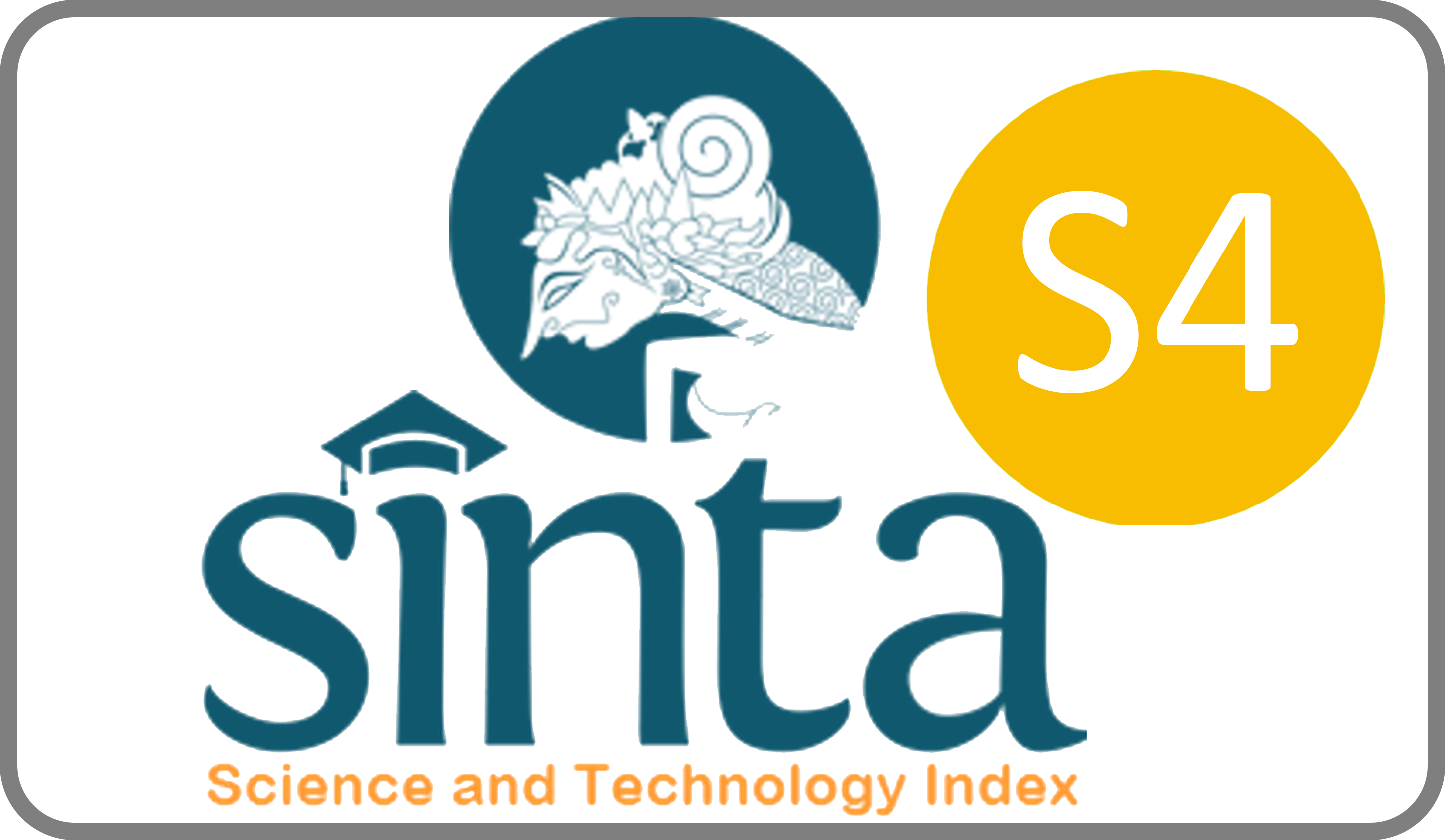‘DAGUSIBU' (GET, USE, SAVE, AND DISPOSE) DRUG MANAGEMENT COUNCELLING IN PENGALANGAN VILLAGE, MENGANTI DISTRICT, GRESIK REGENCY
Downloads
Self-medication behaviors of the society kept increasing as years passed, including for the residents of Desa Pengalangan, Kecamatan Menganti, Kabupaten Gresik. Over-the-counter medicines, the ones that can be obtained without a prescription, have been a prior solution to relieve the symptoms of various diseases. Unfortunately, the consumption of these medicines is not accompanied by proficient knowledge of how to manage medicines properly. Consequently, the health of the community and environment are negatively affected. Therefore, it is considered crucial to educate society as a form of approach made for promoting public health and preventing the irrational usage of medicines. Socialization of the ‘DAGUSIBU' (dapatkan, gunakan, simpan, dan buang) [eng: get, use, store, and dispose] of medicines through a session of interactive mini-lecture and simulation, has been chosen to be the proper modality to deliver such information about managing medicines. About 21 health cadres of Desa Pengalangan are involved in this program, fulfilling the pretests and post-tests as instruments to determine the level of knowledge of the society about medicines. Based on the result of this program, it is noted that an average of 80.9% participants' level of knowledge increases after socialization. Highest increase in the level of knowledge is reported in the topics ‘Golongan obat' [eng: drug's classes] (85,7%) and ‘DAGUSIBU obat' (85,7%), while the topic ‘Penggunaan antibiotik' [eng: antibiotic usage] (71,4%) becomes the topic with the least increase in the level of knowledge. Though these findings seem in line with the previous studies, innovations are required to optimize the increase of society's level of knowledge in managing medicines.
Ahmed, R., Divya, A., Ramyarani, G., Khair, U., & Das, J. (2022). Brief Overview on Over-the-Counter Medicine and their Impact on Community Health. Indian Journal of Pharmacy Practice, 15(2), 65–72. https://doi.org/10.5530/ijopp.15.2.14
Al Mazrouei, N., Ibrahim, R. M., Al Meslamani, A. Z., Abdel-Qader, D. H., & Mohamed Ibrahim, O. (2021). Virtual pharmacist interventions on abuse of over-the-counter medications during COVID-19 versus traditional pharmacist interventions. Journal of the American Pharmacists Association, 61(3), 331–339. https://doi.org/10.1016/j.japh.2021.02.003
Apriani, E. F., Fitrya, Amriani, A., Novita, R. P., Ahmadi, A., Starlista, V., Hardestyariki, D., Khakim, M. Y. N., Supartini, E., & Dewi, S. (2023). EDUKASI DAGUSIBU (DAPATKAN, GUNAKAN, SIMPAN, DAN BUANG) OBAT DENGAN BENAR KEPADA CIVITAS AKADEMISI SMAN 1 CIBINONG KABUPATEN BOGOR. Jurnal BUDIMAS (ISSN:2715-8926) , 5(1), 1–7.
Dira, M. A., & Puspitasari, L. (2021). Penyuluhan Pengelolaan Obat DAGUSIBU (Dapatkan, Gunakan, Simpan, Buang) di Banjar Kodok Darsana Kabupaten Karangasem. Jurnal Abdimas ITEKES Bali, 1(1), 41–45.
Gittins, R., Missen, L., & Maidment, I. (2022). Misuse of Over the Counter and Prescription Only Medication by Adults Accessing Specialist Treatment Services in the UK: A Narrative Synthesis. Substance Abuse: Research and Treatment, 16, 1–10. https://doi.org/10.1177/11782218221111833
Handayani, T. O., & Jatmika, T. D. (2022). PENINGKATAN PENGETAHUAN ANGGOTA KLUB JANTUNG SEHAT TENTANG SWAMEDIKASI PADA MASA PANDEMI COVID-19 DI DESA SIRNAGALIH PROPINSI JAWA BARAT. Jurnal Pengabdian Kepada Masyarakat, 1(12). http://bajangjournal.com/index.php/J-ABDI
Kurniawansyah, I. S., Sopyan, I., & Mita, S. R. (2018). PELATIHAN PENINGKATAN PENGETAHUAN DAN KETERAMPILAN MEMILIH OBAT MATA BAGI TENAGA KESEHATAN DESA CILAYUNG KECAMATAN JATINANGOR. Jurnal Aplikasi Ipteks Untuk Masyarakat , 7(4), 265–268.
Lutfiyati, H., Yuliatuti, F., & Dianita, P. S. (2017). Pemberdayaan Kader PKK dalam Penerapan DAGUSIBU (Dapatkan, Gunakan, Simpan, dan Buang) Obat dengan Baik dan Benar. University Research Colloquium, 9–14.
Marwa, K. J., Mcharo, G., Mwita, S., Katabalo, D., Ruganuza, D., & Kapesa, A. (2021). Disposal Practices of Expired and Unused Medications among Households in Mwanza, Tanzania. PLoS ONE, 16(2), 1–9. https://doi.org/10.1371/journal.pone.0246418
Murray, C. J., Ikuta, K. S., Sharara, F., Swetschinski, L., Robles Aguilar, G., Gray, A., Han, C., Bisignano, C., Rao, P., Wool, E., Johnson, S. C., Browne, A. J., Chipeta, M. G., Fell, F., Hackett, S., Haines-Woodhouse, G., Kashef Hamadani, B. H., Kumaran, E. A. P., McManigal, B., ... Naghavi, M. (2022). Global Burden of Bacterial Antimicrobial Resistance in 2019: a Systematic Analysis. The Lancet, 399(10325), 629–655. https://doi.org/10.1016/S0140-6736(21)02724-0
Panero, C., & Persico, L. (2016). Attitudes Toward and Use of Over-The-Counter Medications among Teenagers: Evidence from an Italian Study. International Journal of Marketing Studies, 8(3), 65. https://doi.org/10.5539/ijms.v8n3p65
Sitidaon, L. A. (2020). Perilaku Swamedikasi. Jurnal Ilmiah Kesehatan Sandi Husada, 9(2), 787–791. https://doi.org/10.35816/jiskh.v10i2.405
Sprod, A., Anderson, R., & Treasure, E. T. (1998). Oral Health Promotion Can be Effective in Changing Knowledge. Evidence-Based Dentistry, 1(12), 12.
Tripathi, K. D. (2003). Antimicrobial Drugs: General Consideration (5th ed.). Jaypee Brothers Medical Publishers.
Zhan, L., Guo, D., Chen, G., & Yang, J. (2018). Effects of Repetition Learning on Associative Recognition Over Time: Role of The Hippocampus and Prefrontal Cortex. Frontiers in Human Neuroscience, 12, 1–12. https://doi.org/10.3389/fnhum.2018.00277
Copyright (c) 2024 Puji Ibaidah, Nadhifa Az Zahra, Antya Putri Sakina, Vivia Inayah Hadi, Putri Nur Azizah, Fidela Putri Ayudya, Rizal Harjuna Guntur Nusantara, Alisa Zahra, Farel Jevons Kiuk

This work is licensed under a Creative Commons Attribution-ShareAlike 4.0 International License.
JLM by Unair is licensed under a Creative Commons Attribution-ShareAlike 4.0 International License.
1. The journal allows the author to hold the copyright of the article without restrictions.
2. The journal allows the author(s) to retain publishing rights without restrictions
3. The legal formal aspect of journal publication accessibility refers to Creative Commons Attribution Share-Alike (CC BY-SA).
4. The Creative Commons Attribution Share-Alike (CC BY-SA) license allows re-distribution and re-use of a licensed work on the conditions that the creator is appropriately credited and that any derivative work is made available under "the same, similar or a compatible license”. Other than the conditions mentioned above, the editorial board is not responsible for copyright violation.


















